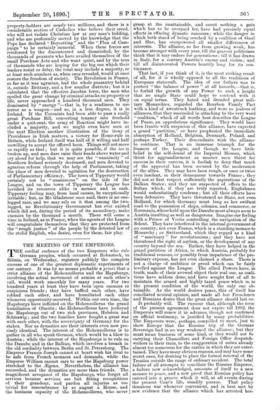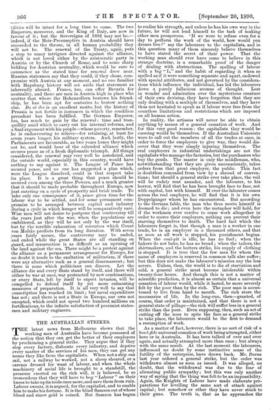THE MEETING OF THE EMPERORS.
THE cordial embrace of the two Emperors who rule German peoples, which occurred at Rohnstock, in Silesia, on Wednesday, registers publicly the complete success of one of the greatest diplomatic experiments of our century. It was by no means probable a priori that a strict affiance of the Hohenzollerns and the Hapsburgs, involving the actual movement of armies at each other's call, would work smoothly for many years. For two hundred years at least they have been open enemies or suspicious friends ; they have baffled each other, have robbed each other, and have humiliated each other whenever opportunity occurred. Within our own time, the Hapsburgs have inflicted on the Hohenzollerns the grand humiliation of Olmiitz ; the Hohenzollerns have jockeyed the Hapsburgs out of two rich provinces, Holstein and Schleswig ; and the two families have fought a great war with each other, with the sovereignty of Germany for the stakes. Nor as dynasties are their interests even now pre- cisely identical. The interest of the Hohenzollerns is to gather in all who speak German, which would be a blow to Austria ; while the interest of the Hapsburgs is to rule on the Danube and in the Balkan, which involves a breach in the old cordiality between Berlin and St. Petersburg. The Emperor Francis Joseph cannot at heart wish his rival to be safe from French menaces and demands, while the Emperor William cannot care to see the Hapsburg power stretched to the ./Egean. Nevertheless, the alliance has succeeded, and the dynasties are more than friends. The magnificent arrogance of the Hapsburgs, who forget all services because services are but fitting recognitions of their grandeur, and pardon all injuries as too trivial for remembrance by so august a House, and the business capacity of the Hohenzollerns, who never grasp at the unattainable, and count nothing a gain which has to be overpaid for, have had precisely equal effects in effacing dynastic rancours ; while the danger in which both stand of being crushed by a coalition of Gaul and Slav, has overpowered all smaller differences, of interests. The alliance, so far from growing weak, has become stronger with every year, till the gravest politicians think that it may endure for generations ; till it has drawn in Italy, for a century Austria's enemy and victim ; and till all disinterested Powers heartily long for its con- tinuance.
That last, if you think of it, is the most striking result of all, for it is wholly opposed to all the traditions of European statecraft. The idea of our fathers was to protect "the balance of power" at all hazards,—that is, to forbid the growth of any Power to such a height that no single State could hope to contend with it on equal terms. They hated and dreaded great mili- tary Monarchies, regarded the Bourbon Family Pact with a kind of awestruck loathing, and were so jealous of alliances, that they succeeded in attaching to the very word "coalition," which of all words best describes the League of Peace, an opprobrious significance. They would have been frantic with suspicion of this alliance, have expected a grand "partition," or have prophesied the immediate absorption of Holland, Belgium, Denmark, Poland, and perhaps Turkey. Their descendants wish the alliance to continue. That is an immense triumph for the framers of the League, and though we have little belief in the self-denial of the Imperial Houses, which thirst for aggrandisement as meaner men thirst for success in their careers, it is foolish to deny that much of the approval has been secured by the moderation of the allies. They may have been rough, or once or twice even insolent, in their demeanour towards France ; they did not at first respect sufficiently the aspirations of the Balkan States ; and they are suspected of offers to the Sultan which, if they are truly reported, Englishmen would unhesitatingly condemn ; but all their efforts have been defensive. They have threatened no State, not even Holland, for which Germany must long as her swiftest road to the possession of ships, colonies, and commerce, or Roumania, whose hold upon the Danube must always seem to Austria insulting as well as dangerous. Imagine our feeling with a Prince of Vectis controlling the navigation of the Solent. They have interfered in the internal government of no country, not even France, which is a standing menace to Monarchy ; or Switzerland, which they regard as a kind of " sanctuary " for revolutionists ; and they have not threatened the right of asylum, or the development of any country beyond the sea. Rather, they have helped in the grand partition of Africa, in which Austria, probably for traditional reasons, or possibly from impatience of the pre- liminary expense, has not even claimed a share. There is not a charge of ambition or greed which can be fairly levelled against the League. The allied Powers have, in truth, made of their avowed object their real one, as coali- tions have seldom done, and have sought first of all to maintain the armed and highly taxed peace which is, in the present condition of the world, the only one ob- tainable. As the world desires peace, this of itself has conciliated neutral opinion, and made all but Frenchmen and Russians desire that the great alliance should last on. It probably will. The rumour that, although the term of the present agreement does not expire till 1892, the Emperors will renew it in advance, though not confirmed on official testimony, is justified by many probabilities. The Emperors were, perhaps, compelled to meet, just to show Europe that the Russian trip of the German Sovereign had in no way weakened the alliance ; but they must mean business of some kind, or they would not be carrying their Chancellors and Foreign Office despatch writersin their train, to the exaggeration of suites akeady almost too numerous for the castles in which they are enter- tained. They have many obvious reasons, and may have some secret ones, for desiring to place the formal renewal of the Treaties outside the range of ordinary accident. The total failure of all attempts to conciliate the Russian Emperor, a failure now acknowledged, amounts of itself to a new menace to peace, and a new proof that Russian policy has entered into a groove which it will, at all events during the present Czar's life, steadily pursue. That policy threatens war whenever convenient, and is best met by new evidence that the alliance which has arrested hos- tilities will be intact for a long time to come. The two Emperors, moreover, and the King of Italy, are now in favour of it ; but the Sovereigns of 1892 may not be,— indeed, if the Heir-Presumptive in Austria should have succeeded to the throne, in all human probability they will not be. The renewal of the Treaty, again, puts a stop to many intrigues directed against the affiance, which is not loved either by the aristocratic party in Austria or by the Church of Rome, and to some sharp bidding for Austrian neutrality, which would be sure to commence as the stated time for renewal drew near. Russian statesmen say that they could, if they chose, com- promise with Austria at any moment, and no one familiar with Hapsburg history will set aside that statement as inherently absurd. France, too, can offer Bavaria for neutrality, and there are men in Austria high in place who mutter that where the Hohenzollern bestows his friend- ship, he has been apt for centuries to bestow nothing else. Do ut des is an excellent motto, but the history of Prussia is not fertile in instances in which the condition precedent has been fulfilled. The German Emperor, Loo, has much to gain by the renewal : time and tran- quillity amid which to carry out his internal reforms, and a final argument with his people—whose poverty, remember, he is endeavouring to relieve—for retaining, at least for seven years longer, his military system. And, lastly, the Parliaments are favourable, as two years hence they might not be, and would hear of the extended alliance which secures peace as of a fresh diplomatic triumph. All things considered, the renewal may very well be antedated, and the outside world, especially in this country, would have nothing to say against it. The League of Peace has secured peace, and no one has suggested a plan which, were the League dissolved, could in that respect take its place. It is a great thing that peace should be secured even among the three Powers, and a much greater that it should be made probable throughout Europe, now just entering on a cycle of prosperity and brisk trade. To take only one consequence of it, peace gives time for the labour war to be settled, and for some permanent com- promise to be arranged between capital and industry during a cycle in which hunger will be comparatively rare. Wise men will not desire to postpone that controversy till the years just after the war, when the populations are embittered, as they will be not only by the war itself, but by the terrible exhaustion of resources which Count von Moltke predicts from its long duration. With seven years fairly secure, the controversy may be ended, and ended while the great States are all standing on guard, and insurrection is as difficult as an uprising of the land against the sea. There might be a protest against the affiance as a permanent arrangement for Europe, for no doubt it tends to the exaltation of militarism, if there were any alternative such as a general disarmament ; but there is none which politicians can discern. Let the alliance die and every State stand by itself, and there will either be war at once, war protracted by new combinations, or every State, left by itself to expect invasion, will be compelled to defend itself by yet more exhausting measures of preparation. It is all very well to say that conscription has reached its limit ; but naval expenditure has not ; and there is not a State in Europe, our own not excepted, which could not spend two hundred millions on fortifications, to the infinite satisfaction of pessimist states- men and military engineers.



































 Previous page
Previous page